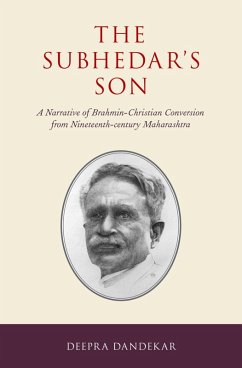Dieser Download kann aus rechtlichen Gründen nur mit Rechnungsadresse in A, B, BG, CY, CZ, D, DK, EW, E, FIN, F, GR, HR, H, IRL, I, LT, L, LR, M, NL, PL, P, R, S, SLO, SK ausgeliefert werden.
The 19th century was a pioneering age for vernacular texts in India. Vernacular writings became popular for making the 'first' interventions of their kind, written by Indians for Indians, and establishing new genres such as the biographical novel. The Subhedar's Son, an award-winning Marathi novel, was written in 1895 and published by the Bombay Tract and Book Society, and comprised overlapping personal and political trajectories. The author, Rev. Dinkar Shankar Sawarkar, inscribed multiple viewpoints into his narrative, including that of his own father, Rev. Shankar Nana (1819-1884), a Brahmin who was one of the early converts of the Church Missionary Society in Western India and served the CMS and the Anglican Church in various capacities for many years. Apart from Shankar Nana's conversion-story, Sawarkar provides readers with a blueprint of what a Brahminical journey towards Christian conversion encompassed, while describing his personal background of having lived a Christian life as a product of both Brahminism and Christianity. Attempting to deconstruct Brahmanism through Christianity he claimed Brahmin roots as a Christian with an aim of combatting the stigma of conversion. Contextualized within the early history of Maharashtra's missions and the specificities of individual conversions, the novel allows modern researchers to appreciate the particularity of regional and vernacular Indian Christianity. This culturally-specific Christianity spurred the production of Christian vernacular print culture, associating 'being Marathi' with broader and more universal frameworks of Christianity. But this new genre also produced nativist forms of Christian devotion and piety. Deepra Dandekar introduces this annotated translation of The Subhedar's Son, with an examination of the Church Missionary Society's socio- political context; a biography of Shankar Nana gleaned from archival sources; a brief summary of Sawarkar's biography; and an analysis of the multiple political opinions framing the book.

